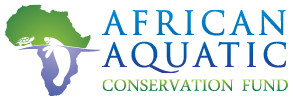Program Description
The African manatee is the most endangered and least studied manatee species in the world. It lives in lagoons within equatorial rainforests, in rivers at the edge of the Sahara Desert, around coastal islands in the Atlantic Ocean, and in many other habitats in 21 countries along the Atlantic African coast, as well as over 2000 miles inland in rivers in Mali and Chad. Despite laws to protect them, the African manatees’ biggest threats are illegal poaching, accidental capture in fisheries (bycatch), and other human-caused threats such as entrapment behind dams and habitat destruction.
Based in Senegal, Dr. Lucy Keith-Diagne has been studying the African manatee for over 15 years, with the goal of increasing knowledge about the species to aid its protection and conservation. Lucy works with African collaborators and graduate students in thirteen countries to develop and sustain studies and conservation projects.
Specific research components include:
- Distribution and habitat surveys to identify and protect important manatee use areas.
- Threat assessments to identify, quantify, and work to reduce threats such as illegal hunting, bycatch, entrapment by dams, and habitat destruction.
- Rescues of injured, entrapped or illegally captured manatees.
- Necropsies of dead manatees to determine cause of death and to collect samples to better understand African manatee physiology and health.
- Population genetics: the first range-wide study of the African manatee to determine where distinct populations exist, estimate population numbers, and determine the diversity and relatedness of different manatee populations across Africa. This will help us learn which populations are in trouble, and which ones are doing well.
- Feeding ecology: using a technique called stable isotope analysis, we’re identifying the types of food resources eaten by manatees throughout the many varied ecosystems in which they live, which will greatly benefit managers in knowing what types of habitat to protect. Unlike all other manatee species, African manatees have been shown to eat fish and mollusks (clams and mussels) in addition to plants.
- Longevity: the first age determination analysis of African manatees using ear bones from carcasses. The technique has been used for Florida manatees for many years, but this is the first time this analysis has ever been conducted for African manatees. Knowing how long manatees live gives us an added insight into the life history of these enigmatic creatures.
The results of our analyses from the biological information we collect helps us to develop a more complete understanding of life history for manatees from several populations throughout West and Central Africa and gives us information we need to conserve them.
Our conservation work includes:
- Since 2007, this project has trained over 100 African researchers from 19 countries in manatee field research techniques. Manatee fieldwork and sample collection has increased in at least 10 countries since 2008.
- Field equipment (and training in its use and care) has been provided to 23 researchers from 14 African countries.
- Our manatee education programs reach 5000 people in up to four countries each year. We create and distribute educational materials in French and English, and we continually strive to find new and creative ways to educate people about the importance of conserving the African manatee and its habitat.
- In 2013 we launched the first international effort to support grassroot African manatee conservation projects through creating alternative livelihoods for hunters in three countries. Our projects in Senegal, Nigeria, and Mali focus on year-round monitoring by local, community-based networks, creating protected areas for manatees, providing alternative livelihoods for manatee hunters, and providing training and educational outreach to local populations. All three projects are run by African biologists, and we plan to expand their initiatives to other locations.
- Lucy Keith-Diagne created an African manatee sub-group of the IUCN Sirenian Specialist Group, the first regional subgroup for any manatee species. The goal of the subgroup is to be able to further determine the status of the species, to be an expert resource for the IUCN and other stakeholders, and to lead and advise others in the growing field of manatee research and management in Africa. Lucy co-chairs this group with Dr. Edem Eniang of the University of Uyo, Nigeria.
- We worked with the Convention on International Trade in Endangered Species (CITES) and the Convention of Migratory Species (CMS) to increase protection for the African manatee through writing the proposals that led to the species being up-listed to the highest protection level under both conventions.
Conservation of the elusive and endangered African manatee over its enormous and mostly remote range will take a long-term, dedicated effort by as many fully trained people working on the ground as possible. The long-term strategy for this program is to build and sustain a cohesive network of African researchers who will determine population sizes and status of African manatees in a majority of the 21 range countries, as well as to develop and implement management plans for conservation of the species. As a result of training and capacity building since 2007, focused and detailed conservation efforts have begun in many countries, such as the protection of specific habitats where manatee use is found to be high, and targeting anti-poaching enforcement to known hunting areas. Collaborators also share their knowledge and train others, further increasing the number of biologists working with the African manatees.
For more information about African manatees, please visit the IUCN Red List website.
Projects
